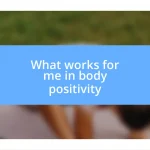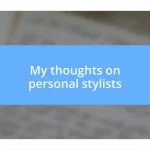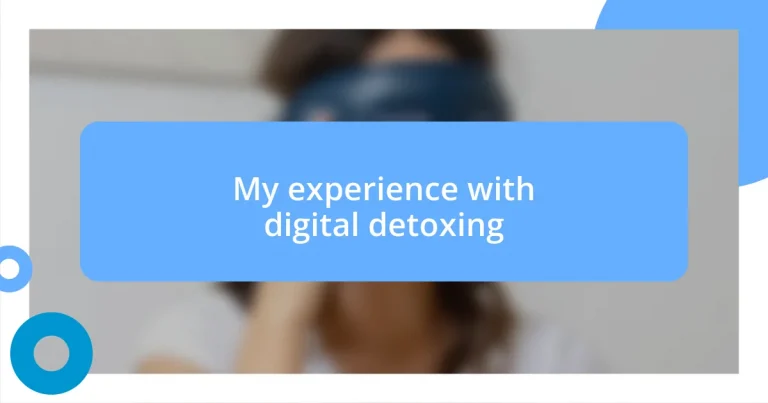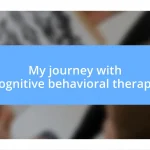Key takeaways:
- Embarking on a digital detox significantly improved mental clarity and creativity, fostering deeper connections with those around me.
- Evaluating and consciously reducing screen time led to increased energy, motivation for offline hobbies, and greater awareness of my screen habits.
- The long-term benefits included enhanced focus, better sleep quality, and more meaningful real-life relationships through intentional interactions.
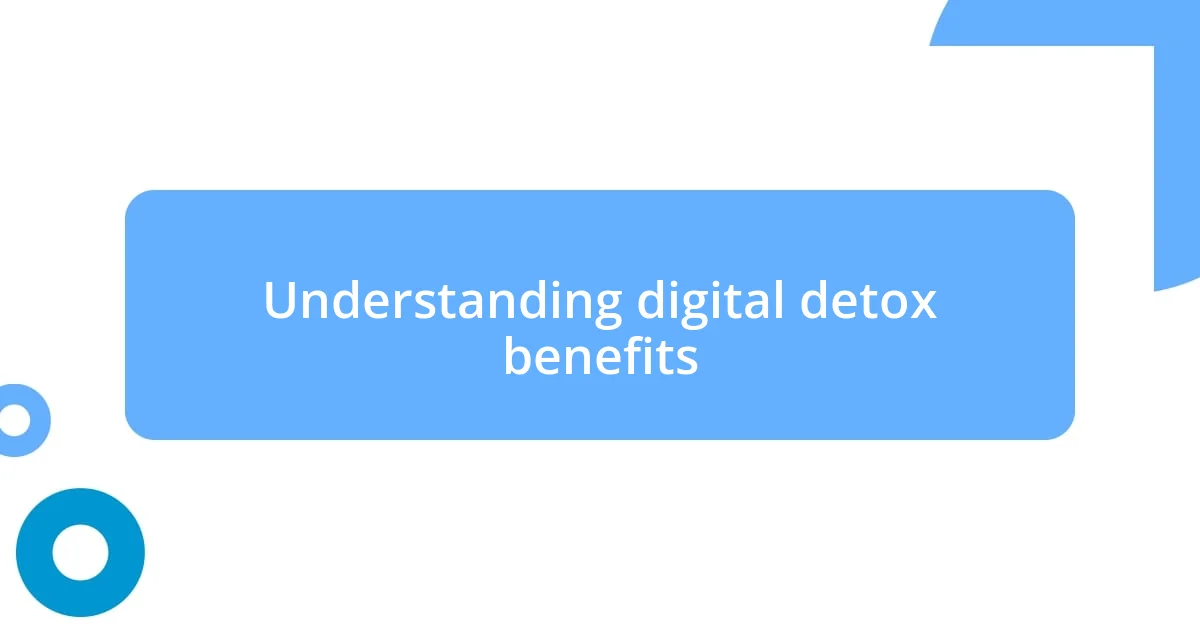
Understanding digital detox benefits
When I first decided to embark on a digital detox, I felt a wave of apprehension but also a flicker of excitement. It amazed me how disconnecting from my screens opened up not just my schedule but also my mind. Have you ever considered how much mental space you reclaim when you’re not constantly scrolling through social media? I certainly didn’t realize it until I started noticing my thoughts wandering freely again, with creativity flowing in like a refreshing tide.
One of the most significant benefits I encountered was my enhanced ability to connect with the people around me. During my detox, I found myself more present during conversations, truly listening instead of half-paying attention while glancing at my phone. Have you ever caught yourself nodding along while your mind drifts elsewhere? It can be unsettling. By stepping back from digital distractions, I rediscovered the joy of deep, meaningful interactions, and I felt more connected than ever to those I care about.
Physically, I noticed my energy levels improving as well. Without the constant pull of devices, I was more inclined to engage in outdoor activities, which revitalized my spirits. I remember how exhilarating it felt to take a walk in nature, breathing in the fresh air without the urge to track my steps or share the moment online. Reflecting on that time, I now understand how essential it is for our well-being to embrace moments of stillness away from screens. Have you thought about how a simple break could transform your own daily experiences?
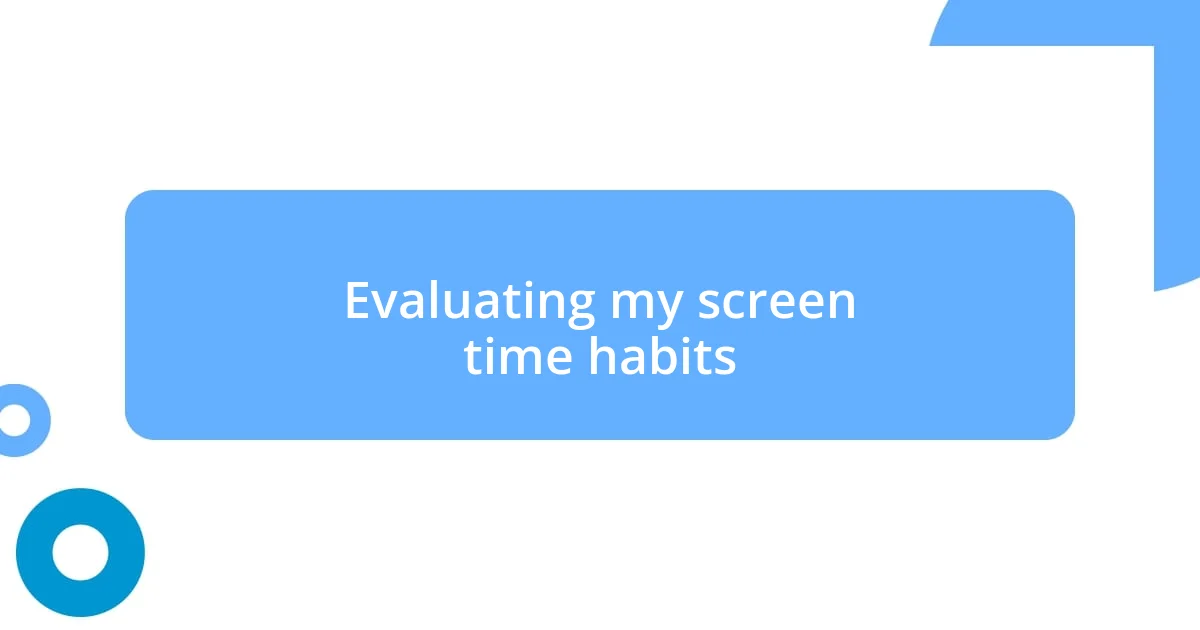
Evaluating my screen time habits
As I dove into evaluating my screen time habits, I was genuinely surprised at the numbers I found. Tracking my usage revealed I was spending over six hours daily on my devices, primarily scrolling through social media. Can you imagine how much time I was missing out on real-life experiences? I began to wonder how this accumulated time impacted my creativity and mental health.
In my quest for balance, I decided to log daily usage through apps designed for this purpose. What struck me was the sheer amount of time I devoted to mindless browsing. I realized that many of my screen time habits were just automatic responses—reaching for my phone during any moment of downtime. Reflecting on it, I think about how powerful it felt to reclaim those minutes by setting small screens down for specific periods. Has this realization ever hit you when you pause and think about how often you reach for your phone?
The more I dissected my screen habits, the clearer it became that the majority of my screen time wasn’t fulfilling. It was almost shocking to see that a large portion was spent on activities that did little for my personal growth. I started to implement stricter limits. After just a few days of consciously reducing my screen time, I noticed a shift in my mood. I felt more energized and motivated to engage in hobbies I once loved but had forgotten amidst the digital noise.
| Screen Time Activity | Hours Spent Daily |
|---|---|
| Social Media | 3 |
| Streaming Services | 2 |
| News and Browsing | 1 |
| Gaming | 1 |
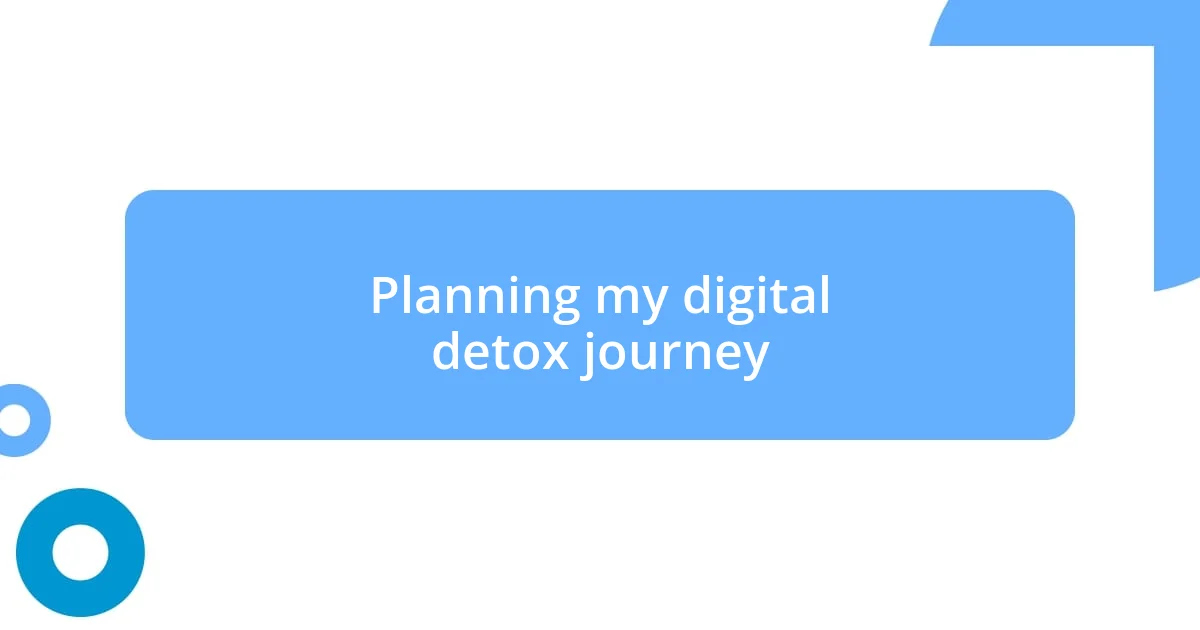
Planning my digital detox journey
In planning my digital detox journey, I found it essential to set clear goals. I remember writing down what I wanted to achieve—better focus, improved mental health, and more genuine connections. It became a source of motivation for me. By outlining these objectives, I could clearly see the purpose behind my decision, making the process feel more structured and intentional.
- Identify specific goals for your detox, like reducing anxiety or improving sleep.
- Choose a duration for your detox, whether it’s a weekend, a week, or longer.
- Develop a support system by sharing your plans with friends or family, and inviting them to join you.
- Prepare alternative activities to fill the time you would spend online, such as reading or exploring nature.
- Reflect on your experience daily to understand the changes in your thoughts and feelings.
I still recall the evening I decided to turn off all notifications and set my phone aside in a drawer. It was liberating yet daunting. I allowed myself to imagine the possibilities that awaited beyond the screen. As I filled my calendar with intentional activities—like visiting a local art gallery or experimenting with new recipes—I started to feel a sense of anticipation. The prospect of reconnecting with myself and the world around me was exhilarating. I knew I was ready to embrace the challenge!
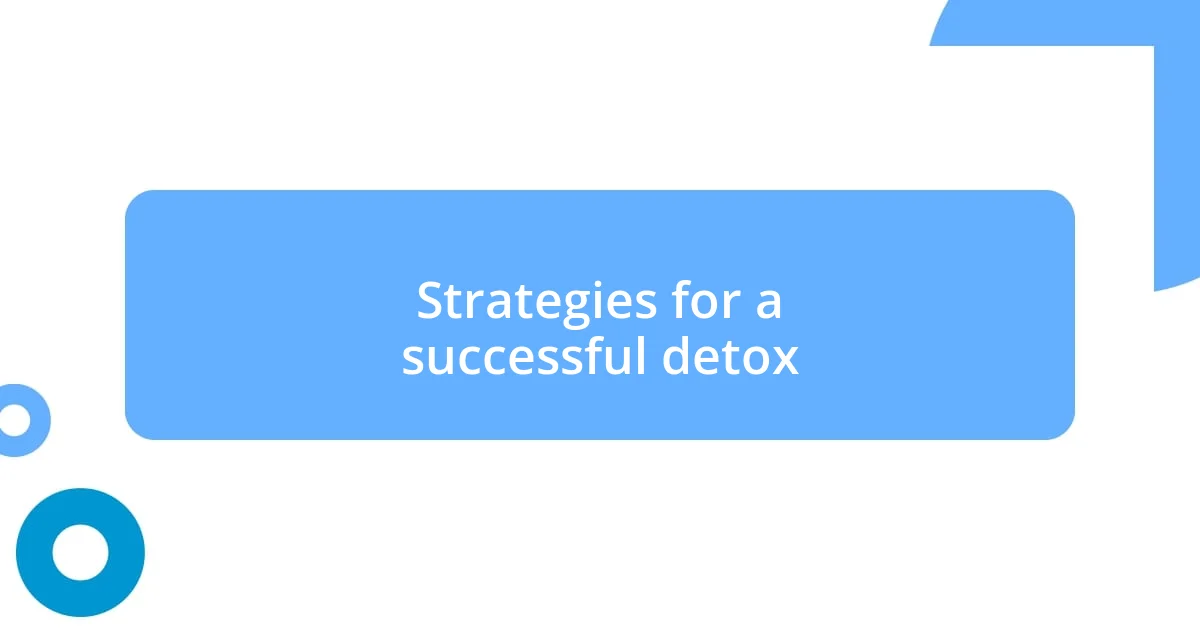
Strategies for a successful detox
Creating a successful digital detox requires intentional planning and commitment. One of the strategies that worked wonders for me was setting specific time slots where I would completely disconnect from my devices. I remember blocking out Sunday mornings just for myself—reading, journaling, or even sipping coffee while watching the sunrise. That one simple change opened up a whole new world of mindfulness I didn’t think I’d missed. Have you ever tried dedicating an entire morning, free from your devices?
Finding engaging alternatives was another key element. I discovered that I had forgotten the joy of a good book or even just a long walk in nature. Once I started prioritizing these activities, my thoughts began to shift. Instead of feeling deprivation, I felt excitement for the possibilities my offline life offered. Why is it that we often overlook the simple pleasures that bring us joy? I realized time spent offline could be just as enriching, if not more so.
Lastly, accountability can make a huge difference. I reached out to a couple of friends who were also interested in reducing their screen time. We formed a little support group, sharing our goals and progress. When I relayed stories of my week, from baking a new recipe to exploring a new hiking trail, it fueled my determination. Have you ever noticed how sharing your journey can amplify your commitment? It became a game-changer for me, proving that sometimes, we thrive best when we’re not alone in our endeavors.
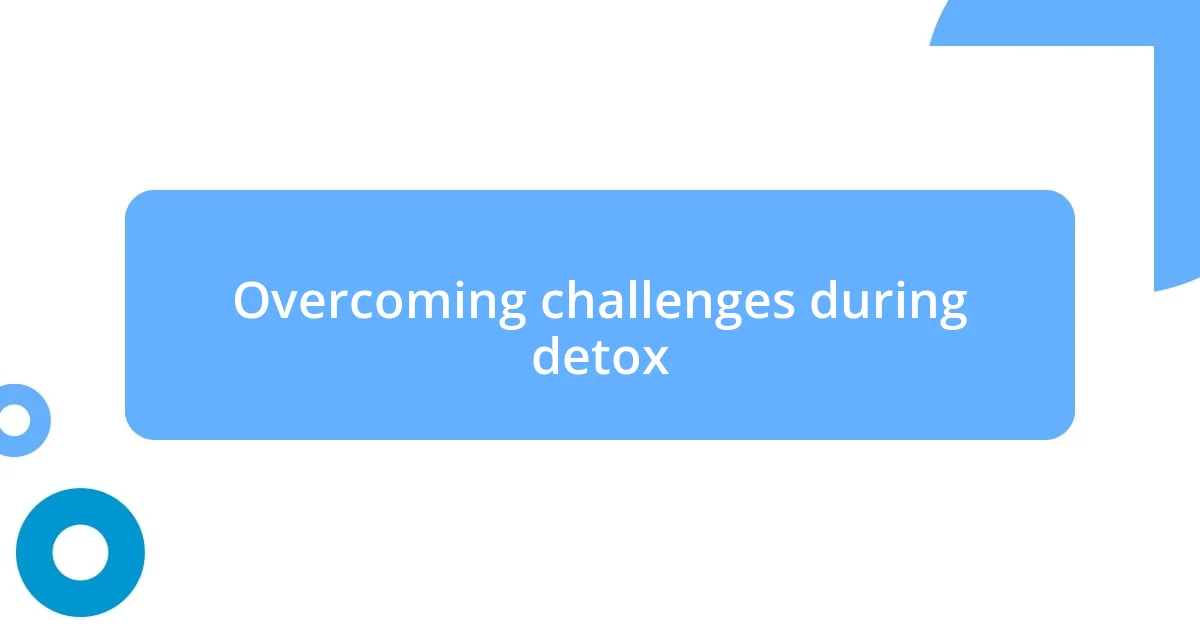
Overcoming challenges during detox
Moving through my digital detox journey, I stumbled upon unexpected hurdles. For instance, the nagging urge to check my phone, even for mundane things like the weather, was surprisingly strong. It felt like a battle between my desire for focus and the habitual pull of technology. Have you ever faced that same temptation? It took real effort to resist, but I learned to redirect that energy into something productive, like sketching or practicing mindfulness.
As I progressed, I found that some days were markedly more difficult than others. There were moments when a sense of loneliness crept in, especially during social gatherings where everyone seemed glued to their screens. Interestingly, that feeling pushed me to engage more deeply with the people around me. I remember one particular evening, where instead of silently scrolling, I struck up conversations about our favorite childhood games. Have you ever realized how refreshing it is to connect face-to-face? That feeling of shared laughter became one of my cherished moments during the detox.
Sometimes, the emotional landscape of a digital detox can be overwhelming. I encountered feelings of anxiety, wondering if I was missing out on something important. It took introspection to understand that those feelings stemmed from a fear of disconnection. Reflecting on this, I started journaling about my thoughts, unraveling each thread of anxiety and transforming it into a sense of empowerment. Have you ever found that writing about your feelings helped clarify your thoughts? This practice not only soothed my anxious mind but also gifted me insights into my relationship with technology, allowing me to emerge stronger and more self-aware.
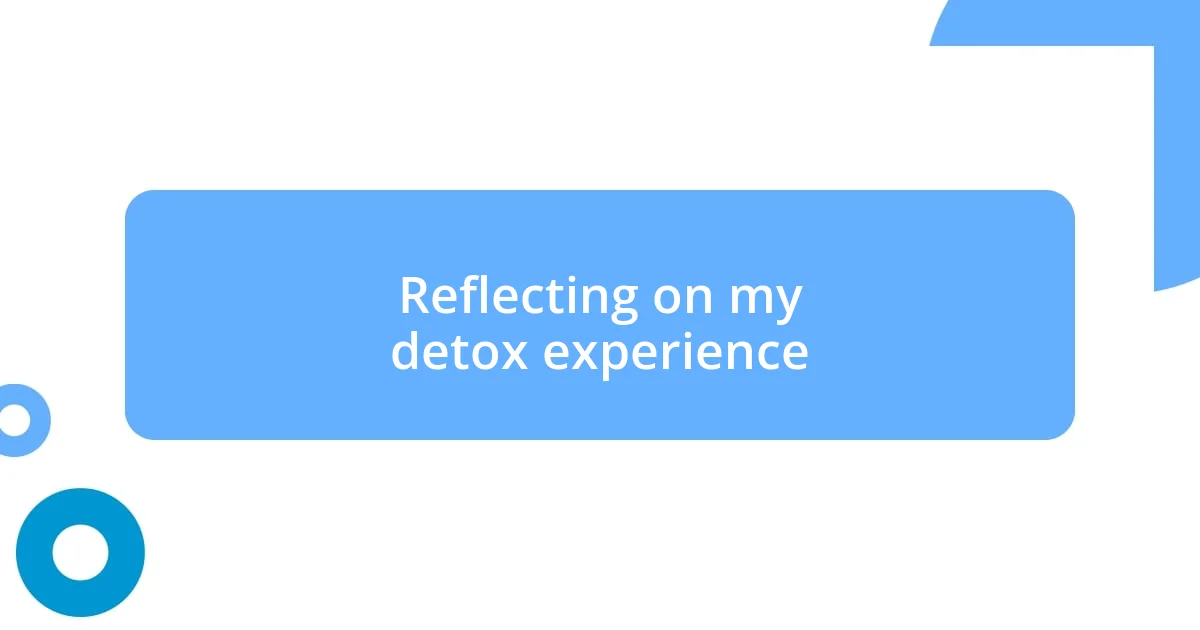
Reflecting on my detox experience
Reflecting on my digital detox experience, I can’t help but feel a sense of gratitude for the insights I gained. There was a moment when I found myself sitting quietly in my living room for an entire afternoon—no notifications, no distractions. It struck me how I used to fill my free time with endless scrolling instead of simply enjoying the silence. Isn’t it surprising how much we can appreciate stillness when we allow ourselves to experience it?
Another unique aspect of the detox was rediscovering the beauty in my surroundings. One sunny day, I took a stroll through my neighborhood, noticing the vibrant colors of the flowers that I had overlooked for years. As I breathed in the fresh air, I realized how much I had taken the world for granted when I was perpetually glued to my phone. Have you ever taken a moment to simply observe and appreciate the little things around you? That shift in focus enriched my experience immensely and brought a newfound joy that I hadn’t felt in a while.
As the detox progressed, I found my evenings transformed. Without the lure of screens, I began exploring new hobbies—like learning to play the guitar. I remember the thrill of finally strumming a chord that sounded halfway decent! It was exhilarating to achieve something tangible without the instant gratification technology often provides. Can learning something new be the antidote to those moments of boredom we sometimes feel? Embracing creativity helped me rebuild my confidence and instilled a sense of accomplishment that far surpassed any fleeting likes or shares.
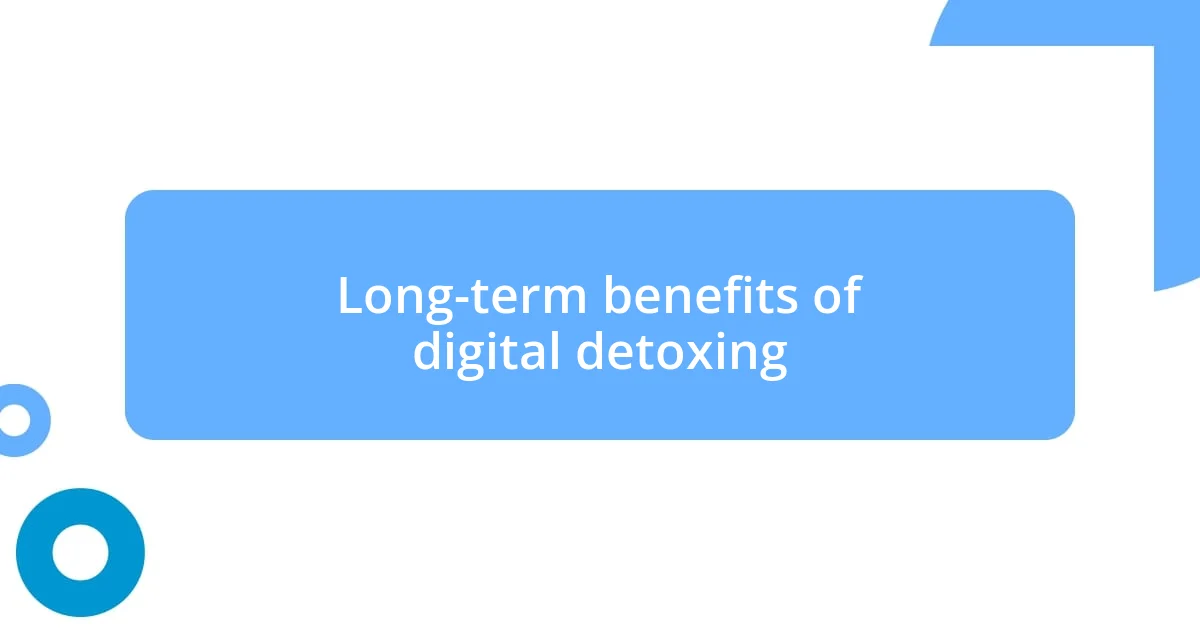
Long-term benefits of digital detoxing
The long-term benefits of digital detoxing have truly reshaped my perspective on life. One major change I’ve experienced is a renewed sense of focus. I remember a time when I struggled to concentrate on tasks for even short periods. After detoxing, I discovered the joy of deep work, immersing myself in projects without constant interruptions. Could it be that freeing ourselves from digital distractions allows our minds to function better?
In addition to improved concentration, my sleep quality saw a remarkable improvement. I used to scroll through my phone right before bed, which left my mind racing. Now, I find solace in winding down with a book instead. This simple shift helped me cultivate a peaceful bedtime routine, leading to more restful nights. Have you ever noticed how the absence of screens allows your mind to unwind and recharge more effectively?
Perhaps one of the most rewarding long-term effects has been the enhancement of my real-life relationships. I’ve developed a greater appreciation for genuine interactions. When I stopped reaching for my phone during social occasions, I began to engage in deeper conversations and listen more attentively. I recall a gathering where I connected with an old friend over shared stories instead of just responding to quick notifications. Isn’t it fascinating how the richness of these interactions outweighs any superficial online connection?
